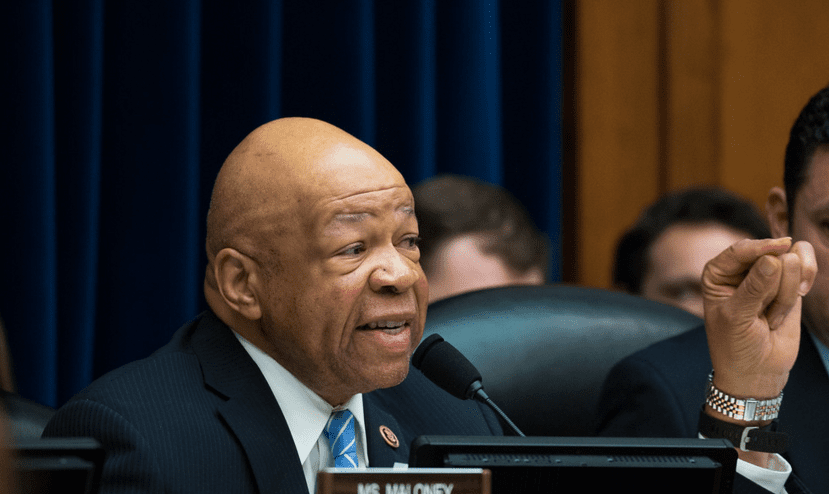Cummings Manned the Bridge of Justice
By • October 18, 2019 0 493

Rep. Elijah E. Cummings (D-Maryland), chairman of the House Committee on Oversight and Reform, with responsibility for the ongoing Trump impeachment inquiry, died at three in the morning yesterday, Oct. 17. He was 68 and had been in failing health for some time.
A lot of moral energy, the echo of a strong and certain kind of voice, went with his passing like a quiet wind. Many, including a roster of political friends and foes, noted the loss.
For a good part of the day yesterday, the airwaves and the internet were blessed with the intermittent but still constant playing of his presence and voice. A clip that kept coming up: After the hearings at which Trump attorney Michael Cohen testified, Cummings presented a moving challenge: “When we’re dancing with the angels, the question will be asked, in 2019, what did we do make sure we kept our democracy intact? Did we stand on the sidelines and say nothing? Did we play games?”
Cummings never did find a slot on the sidelines appealing. He was a powerful player on Capitol Hill, upholding the values of civil rights, justice and equality, but he was also the kind of politician who was not so overwhelmed by his own personality to keep him from reaching out — making not just useful connections but personal contact, based in mutual respect, even affection.
Rep. Mark Meadows (R-North Carolina), a very conservative House leader who shared a close friendship with Cummings, said, “There was no stronger advocate and no better friend than Elijah Cummings. I am heartbroken for his wonderful family and staff. Please pray for them,” adding, “I will miss him dearly.”
Calling Cummings “our brother in Baltimore,” House Speaker Nancy Pelosi (D-California) said, “He was considered our North Star. He was a leader of towering stature, character and integrity. He lived the American dream … and he wanted it for everyone else. He spoke with unsurpassed clarity and moral integrity.”
Even President Donald Trump, after a particularly heated exchange in which he described Cummings’s district as “rat infested,” noted Cummings’s qualities in an unusually respectful and measured expression of condolences. “I got to see firsthand the strength, passion and wisdom of this highly respected political leader. His work and voice on so many fronts will be very hard, if not impossible to replace!”
Noted civil rights leader Rep. John Lewis (D-Georgia) said that that the country had lost a great leader “at a time of crisis in our democracy,” and described Cummings as a “voice in the wilderness.” The two African American leaders in the House were often mistaken for each other; along with a physical resemblance, both had a way of commanding the space in which they stood with their voice, their manner.
In the past year or so, while spending time in a hospital, I had a talk with a man who was helping me prepare for an X-ray. We talked about history and politics, and he said, “I was at the bridge.” I didn’t have to ask him what bridge he was talking about. He was a marcher, an activist, part of that generation of King, of Evers, of Dorothy Height, many of whom ended up hand in hand and under siege at Selma long ago.
I don’t know if Cummings was at the bridge at Selma or not, but in his political record, in his speeches and battles, he was, we can be certain, manning the bridge of justice for all, every day.
He spoke in that same tone of uplift, of rising tides and multitudes. It was the voice at the street-corner rallies, at the Sunday church service and, of course, in the corridors of power. His parents were sharecroppers, but he rose to overcome slow beginnings to achieve a law degree from Howard University, inspired, he said, “by watching Perry Mason shows on old-time television.” According to reports, he helped integrate a local swimming pool in Baltimore at age 11.
The voice was persuasive and moving, whether angry or particular in details. Confronted with corruption, he inspired people and country to a higher morality, saying after the Cohen hearing: “We are better than this.”
His death, less shocking than it might have been due to his lingering illness and absences from the House, was still unexpected, making it hard to be consoled or to fill the loss. All of us are poorer for his passing, richer in our memory.
Dancing with the angels now, in life Elijah Cummings did not stand on the sidelines; he was not silent, he did not play games.

